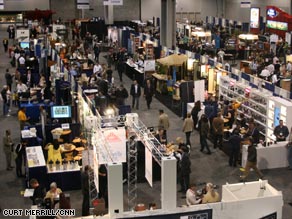High-end coffee business slows during recession
- Story Highlights
- High-end specialty coffee industry not immune to effects of recession
- Many companies still doing well, with some looking to expand
- Hundreds of companies from around the world gathered in Atlanta for annual expo
- British barista wins World Barista Championship held in conjunction with expo
- Next Article in U.S. »
CNN
ATLANTA, Georgia (CNN) -- The high-end specialty coffee industry isn't immune to the effects of a recession, but many companies are still doing well.

Growers, roasters and equipment manufacturers were represented at the coffee expo in Atlanta.
Portland Roasting had a slow holiday season, but business is picking up, said owner Mark Stell. "February was a great month for us," he said.
Stell traveled from Oregon to Atlanta, Georgia, for the Specialty Coffee Association of America expo, where the show floor was filled with nearly 800 booths featuring everything from exotic coffee beans to the latest Italian espresso machines.
Stell's company sells about a million pounds of coffee a year. He said sales to offices and hotels are down but are being replaced by orders from grocers and universities.
"People don't leave coffee," he said. "They just get it differently."
Tony Riffel owns Octane Coffee in Atlanta and was watching the 10th annual World Barista Championship, held in conjunction with the expo at the Georgia World Congress Center. Pushcart owner Gwilym Davies of London, England, won the 2009 barista crown. ![]() Watch baristas battle for the world title »
Watch baristas battle for the world title »
Riffel said business at his coffee shop was flat last summer, but sales are up 10 percent for the first quarter of 2009.
"The first part of this year has been our best ever," he said. "People are being careful with what they're spending money on, but they're spending it on quality products."
Business is good enough that Riffel plans to open a second location this year. "Now is a really good time to do that," he said. "Developers and landlords are more flexible and negotiable," even though banks are "pickier than normal."
Joseph Taguman also knows about picky banks. The general manager of the Zambia Growers Association said the lack of financing is holding back the association's 80 farmers.
Don't Miss
Taguman said the farmers could grow more than their current rate of about 300 metric tons per year, but trees take time to grow and long-term financing is hard to come by in Zambia.
A couple of aisles over from Taguman's booth, Shawn Contreras sees a similar problem. Contreras is the sales director for Diedrich Manufacturing, which has been selling roasting equipment for nearly 30 years.
He said wholesale roasters are continuing to grow, but smaller operations are having "an extraordinarily difficult time" getting funding.
Consultant Andrew Hetzel acknowledges that credit is a hindering factor for companies, but he is optimistic about the specialty coffee industry.

"The U.S. market is continuing at a steady pace," he said. But it's a slower pace than the past few years.
"Coffee is something that has been with humanity for 1,500 years," Hetzel said. "It's not going anywhere any time soon."
All About Coffee

 Sit tight, we're getting to the good stuff
Sit tight, we're getting to the good stuff